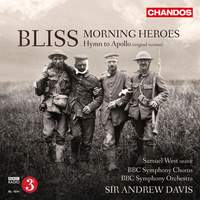Recording of the Week,
Andrew Davis conducts music by Arthur Bliss
I was surprised and delighted to hear about Andrew Davis’s new recording of Morning Heroes; one of my favourite choral works, but shamefully rarely heard. One could say that it is to the First World War what Britten’s War Requiem is to the Second, but this is only a partial truth. There is a far more personal aspect: in Morning Heroes, Bliss comes to terms with the loss of his brother at Thiepval and his own traumatic experiences in the trenches. This personal journey is accomplished in parallel with a moving commentary on the universality of war’s tragedy throughout the ages and across the continents – setting passages from Homer’s Iliad, the eighth-century Chinese poet Li Tai-Po, Walt Whitman and the First World War poets Wilfred Owen and Robert Nichols.

One of the interesting aspects of Morning Heroes is the use of a narrator in two movements. Having heard a recording featuring the stentorian boom of Brian Blessed, I was curious as to what Samuel West would make of the part – the orator opens the first movement, so the choice of speaker is absolutely key. At times he seems to sound almost strict; as he speaks the words of Hector’s wife Andromache (in an extract from the Iliad where the Trojan warrior takes his leave of his wife and son), one feels not so much that she is fearfully begging her husband to remain, but almost telling him off for his decision to depart for the war. Hector’s reply, too, seems a little lacking in warmth – a slightly aloof aristocrat, not so much a loving partner leaving his family.
Davis has a talent for bringing out phrases and inner parts that other performances bury, and the atmospheric brass and wind writing of Whitman’s The Bivouac’s Flame was a particular joy to rediscover. Here Bliss manages to combine the solemn, the sinister and the wistful, and Davis does well to avoid veering into grotesque caricature in setting the scene – with the result that the male chorus’s final yearning outburst doesn’t feel out of character, as it sometimes can.
After this sensitive interlude, I began to worry whether the return to the warlike Iliad would pack enough of a punch – and at the beginning of Achilles Goes Forth to Battle I briefly thought my fears had been well-founded. The opening of this furious movement was indeed less loud and the low brass less savage than I’d been expecting, but in the powerful crescendo a few bars before the chorus’s entry it became clear that Davis was merely keeping his powder dry until the right moment; Bliss’s majestic music suddenly took flight. The “roll-call” of the war’s heroes, far from being boring, is hair-raisingly relentless – the tutti top B flat for the tenors and sopranos just the right mixture of hysteria and control, the brass finally let fully off the leash and Davis’s brisk tempo adding to the excitement. Chorus-master Stephen Jackson’s sopranos deserve particular praise for their excellent tone on a closing top C that is often little more than a yelp.
For me, the emotional crux of Morning Heroes comes in the final movement. Bliss leaves behind the mythical excitement of Troy and sets war poetry that must have been agonisingly personal for him even to read, let alone to put into music. The orator returns with Owen’s Spring Offensive, and West’s calm tone is now absolutely right – much more effective than in the first movement. His reading is underpinned by subtle, lonely drum-rolls – the rumbling of the distant guns of the front line.
Bliss’s slow-burning apotheosis now begins, a cappella at first and then tutti – Nichols’s depiction of the mist rising from a shell-scarred battlefield leads to the work’s climax, which I personally would rate as one of the most moving passages written in the twentieth century. Davis’s tempo is faster than I’m used to hearing, but it’s not an unwelcome choice. It changes the mood subtly – tilting the balance slightly in favour of a heroic optimism – and in doing so also casts a different, serene rather than sombre, light on the final page or so of music, which dies away into a hushed pianissimo chord.
This final section, while not mentioning Apollo by name, does refer to the “hero and heroes’ god, the invincible Sun” – which provides an intriguing link to the other work on this disc, Bliss’s Hymn to Apollo, recorded here for the first time in its original version for slightly larger forces. A purely orchestral work lasting under ten minutes, it features numerous indulgent wind solos in which the BBC Symphony Orchestra’s section principals show their mettle, and has a rather Impressionistic feel – the first bars in particular seeming to echo Debussy’s La mer before a processional mood is established.
If the Hymn to Apollo made less of an impact on me than Morning Heroes, this is only because Davis’s performance of the former was so powerful. This is a highly significant musical response to the First World War, and Davis and his musicians give it their all. If there’s any justice, this new recording will help to restore the work to its rightful place in the repertoire.
Samuel West (orator), BBC Symphony Chorus, BBC Symphony Orchestra, Andrew Davis
Available Formats: SACD, MP3, FLAC, Hi-Res FLAC



